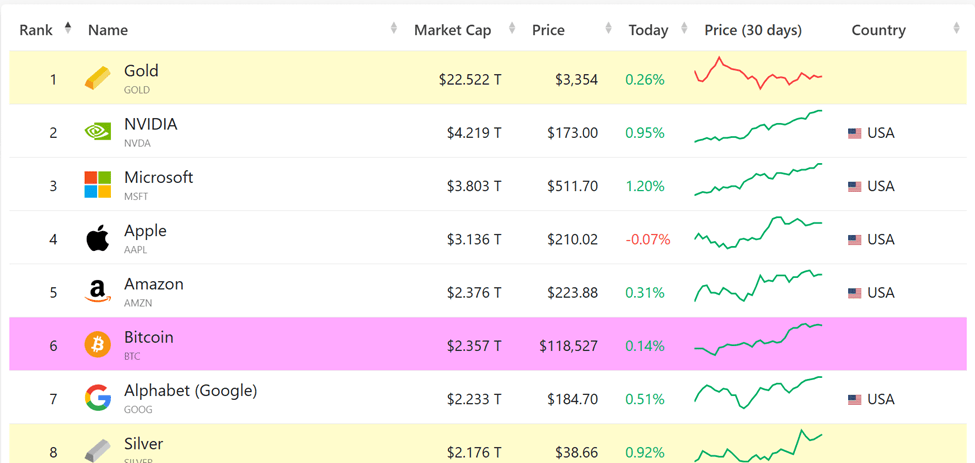The price of Bitcoin has now entered the six-figure range, as institutional capital floods into the market. In this context, analysts are asking: Could Satoshi Nakamoto — the mysterious creator of Bitcoin — become the richest person on the planet before the end of this year?
With approximately 1.1 million BTC believed to be owned by Satoshi, his asset value has now surpassed $130 billion at current market prices.
What are the conditions for Satoshi to surpass Elon Musk in 2025?
If all necessary conditions are met, Satoshi Nakamoto could very well become the richest person in the world before the end of 2025. This means surpassing Elon Musk's estimated wealth of $350–400 billion — largely derived from Tesla, SpaceX, and social media X (Twitter).
To achieve this, the price of Bitcoin will need to reach between $320,000 and $370,000, meaning an increase of 2.7 to 3.1 times the current level.
However, reaching this milestone is not just a simple matter of price. It is also a measure of Bitcoin's global acceptance, macroeconomic fluctuations, and the digitization of assets in how investors (including traditional financial institutions) value assets and measure wealth.
Some experts believe that Satoshi Nakamoto becoming the richest person in the world by the end of 2025 is not impossible, however, they also acknowledge that this timeline is quite tight.
"If not 2025, then 2026 is almost a sure bet," shared Vikrant Sharma, CEO of Cake Labs — the developer of Cake Wallet.
This means that, although still speculative, the aforementioned price is not out of the realm of possibility if the market sees strong capital inflows, favorable macro factors, and achieves breakthroughs in legal frameworks.
Could financial institutions push Bitcoin to $320,000 before the end of the year?
Since the approval of Bitcoin ETF funds, momentum from financial institutions has surged. For example, BlackRock's IBIT currently holds about 727,359 BTC.

The flow of funds into spot ETFs is exceeding the expectations of many analysts, with some reports suggesting that BlackRock's IBIT ETF could reach $100 billion in assets as early as this month.
However, for the price of Bitcoin to rise from $118,000 to $320,000 in just 5 months, what the market needs is not just continuity — but a historic breakout.
"For Bitcoin to reach $320,000 in 5 months, buying power from financial institutions must exceed all previous records. This would require a massive event — for example, the U.S. government announcing strategic reserves in Bitcoin or national wealth funds fully investing in BTC," said Maksym Sakharov, co-founder and CEO of the decentralized on-chain bank WeFi.
Even with the market backed by U.S. Treasury bond tensions, accommodative monetary policies, and geopolitical instability, the likelihood of all factors converging in 2025 is low — but not entirely impossible.
"This will require an event contrary to a black swan... like continuous institutional cash flow, positive legal news, major central banks easing policies, and large companies massively adding BTC to their assets," said Lennix Lai — global CCO of OKX.
Why is Satoshi not on the billionaire list?
Despite holding enough Bitcoin to compare with the wealth of many countries, Satoshi Nakamoto still does not appear on Forbes or Bloomberg's billionaire lists. Although the crypto market has reached a scale of $3.9 trillion, it is still undervalued in traditional asset rankings. Experts largely believe this is due to custody issues, identification, and lack of transparency.
"If we include his Bitcoin, Satoshi would rank 11th globally in wealth," Sakharov pointed out.
Meanwhile, exchange founders like Binance's Changpeng Zhao (CZ) or Coinbase's Brian Armstrong are listed, largely because their assets are valued based on company worth, not the amount of self-custodied crypto.
"This is absurd at the moment... Their valuation methods are becoming increasingly outdated," he added.
Meanwhile, Sharma notes that self-custody of Bitcoin is completely reasonable, considering the importance of this asset as one of the largest market-cap assets.

Sharma also believes that the decision to self-custody Bitcoin is justified, given the ongoing efforts of central banks to devalue fiat, making Bitcoin more attractive.
"Why not hold the 5th largest asset by market cap? As central banks continuously seek to devalue fiat, transitioning to a solid currency is inevitable," Sharma shared.
Escrow, transparency, and the future of billionaire asset rankings
Infrastructure needs to be improved for cryptocurrencies to be treated on par with stocks or real estate. Standards such as custody asset audits, self-custody asset verification, and reporting standards are still in the process of being finalized.
According to Sakharov, the challenges regarding processes are currently surpassing technical issues, as asset managers still lack reporting standards that could provide the same level of reliability as stocks for digital assets.
"If assets are held through ETFs or companies holding Bitcoin in treasury, reporting is quite simple. But with self-custody, asset disclosure becomes more complex, and Forbes currently does not have a system to handle this discrepancy," Sharma added.
However, the winds are changing — cryptocurrency audits are becoming more common, and asset managers are beginning to recommend allocating 5–10% of portfolios to crypto.
Sovereign wealth funds are also turning their eyes toward Bitcoin. This could lead to the integration of digital assets into global billionaire rankings in the near future.
The mysterious billionaire
Meanwhile, Bitcoin is no longer a fringe phenomenon. From ETFs, corporate treasuries to comparisons with central bank gold, this pioneering cryptocurrency has officially entered the era of institutional finance.
Yet, its mysterious creator — Satoshi Nakamoto — remains an enigma, possessing wealth greater than many countries, yet completely absent from all billionaire rankings.
Whether Bitcoin reaches $320,000 this year or next, for many, the more interesting question is not whether he will become the richest person in the world, but: who exactly is Satoshi?